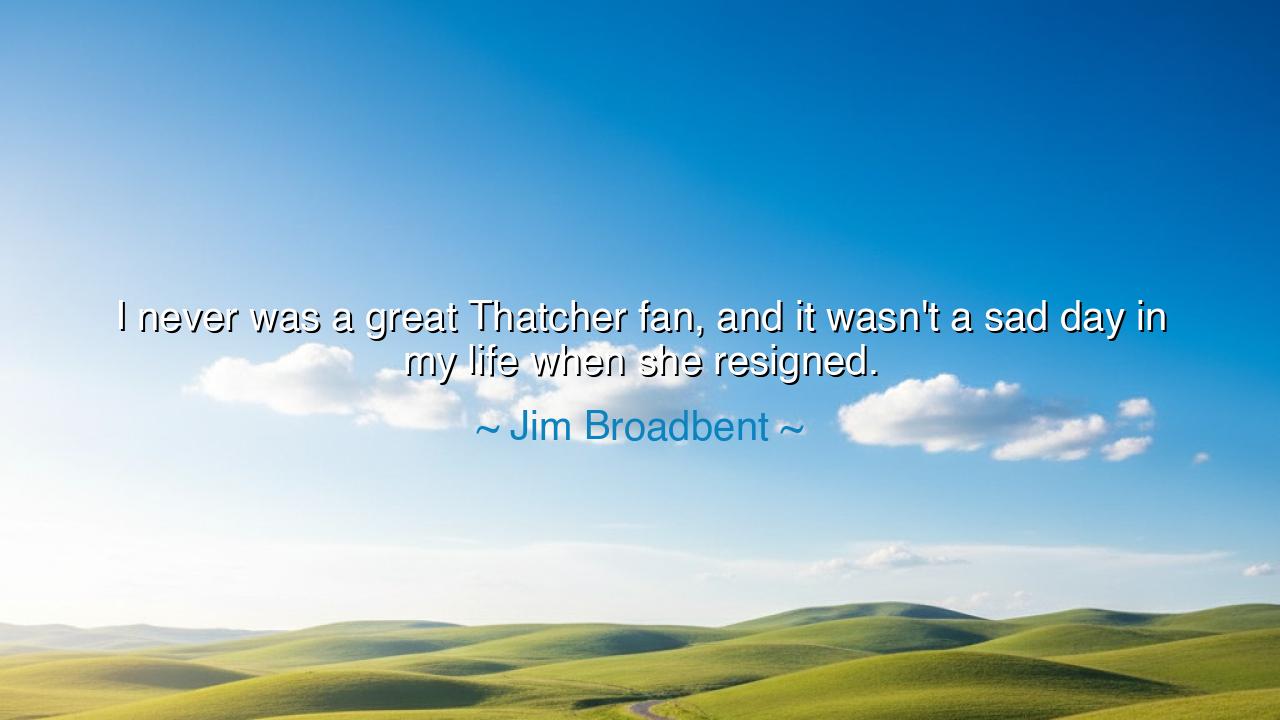
I never was a great Thatcher fan, and it wasn't a sad day in my
I never was a great Thatcher fan, and it wasn't a sad day in my life when she resigned.






Jim Broadbent once spoke with the calm certainty of a man who had witnessed a storm pass: “I never was a great Thatcher fan, and it wasn’t a sad day in my life when she resigned.” Though his words are simple, their roots reach deeply into the soil of history, for they speak not only of politics, but of the enduring human struggle between power and principle, between the rule of the few and the voice of the many. His statement is not one of bitterness, but of quiet release—a recognition that eras of hardness, no matter how mighty, must one day give way to gentler dawns.
To understand the meaning of Broadbent’s words, one must recall the time of Margaret Thatcher, the “Iron Lady” who ruled Britain from 1979 to 1990. Her leadership reshaped a nation and divided a people. To some, she was a savior—reviving a faltering economy, taming unions, and giving rise to a new age of free enterprise. To others, she was a destroyer—breaking communities, dismantling industries, and turning compassion into collateral. Broadbent, like many artists of his generation, stood among those who watched her policies carve deep wounds into the working spirit of England. Thus, when he says it was “not a sad day” when she resigned, he speaks for the weary hearts who longed for a softer age, one where humanity mattered more than profit.
In the tone of his words, one can almost hear the sigh of a nation exhaling. For eleven years, Thatcher’s rule had been both relentless and transformative, leaving behind triumphs and scars alike. Broadbent’s lack of sorrow was not vindictive—it was reflective. He mourned not her departure, but the suffering that made it necessary. The artist’s heart, attuned to empathy, cannot rejoice in the fall of any person, but it can recognize the end of a shadow as a kind of healing. To him, the resignation of a ruler so polarizing was not a cause for celebration, but a moment to hope that kindness might again find its voice in governance.
The ancients would have recognized this sentiment well. When tyrants fell in Greece or Rome, philosophers did not always cheer—they warned instead of the balance that must follow. For history teaches that no empire, no leader, no ideology endures forever. All things must return to the equilibrium of the earth. When power hardens into arrogance, the people’s endurance becomes rebellion, and the cycle begins anew. Broadbent’s words echo this timeless rhythm. He did not rejoice in Thatcher’s fall; he acknowledged its inevitability. The Iron Lady, unbending to the last, had forged a path that could not last without fracture.
Consider the story of another leader, far removed in time: the Pharaoh Akhenaten of ancient Egypt. In his pursuit of singular vision—of one god, one truth—he remade the kingdom in his image. But his reforms, too rigid and swift, alienated his people. When he died, Egypt returned to its older ways, his monuments erased, his memory shadowed. The lesson of Akhenaten and Thatcher alike is the same: leadership without empathy breeds isolation, and isolation invites undoing. What Broadbent witnessed was not a victory over a woman, but the fall of an idea too brittle to bend with its people.
Yet, his quote also carries a subtler message: that it is possible to disagree without hatred. Broadbent does not speak venom; he speaks weariness. His tone is that of one who has endured a long reign and simply wishes for rest. In this, there is wisdom. The wise do not dance on graves, nor curse the past; they learn from it. When he says “it wasn’t a sad day,” he reminds us that endings, even divisive ones, are natural parts of renewal. In every age, there comes a time when old powers must yield to new voices, and when they do, the wise look forward, not backward.
So let the teaching of Jim Broadbent’s reflection be this: power is not eternal, and no leader stands above the pulse of the people. When a ruler’s strength forgets compassion, it becomes a cage; when it remembers humility, it becomes light. Do not cling to those who divide, nor rejoice in their downfall—but seek instead the balance that follows. Every resignation, every fall from power, is both an end and an invitation: the chance to rebuild with wisdom, to govern with grace, to listen once more to the quiet voices that history too often silences.
Thus, when you hear Broadbent’s words, hear not scorn, but clarity. For every age will have its Thatchers, and every soul will live beneath powers it does not love. What matters is not the bitterness we feel in their rule, but the lessons we carry from their passing. Be firm, but not cruel. Be brave, but not hardened. And when the iron age gives way to one of humanity, let it be said that we, too, did not mourn the fall of force—but rejoiced in the return of heart.






AAdministratorAdministrator
Welcome, honored guests. Please leave a comment, we will respond soon